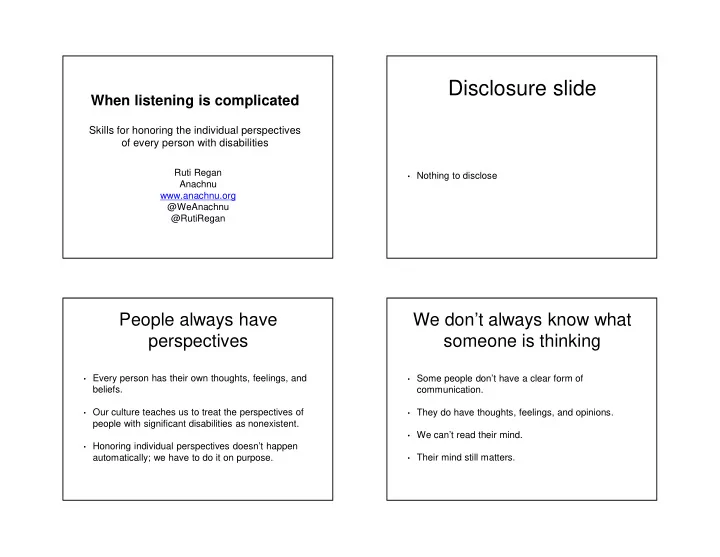

Disclosure slide When listening is complicated Skills for honoring the individual perspectives of every person with disabilities Ruti Regan • Nothing to disclose Anachnu www.anachnu.org @WeAnachnu @RutiRegan People always have We don’t always know what perspectives someone is thinking • Every person has their own thoughts, feelings, and • Some people don’t have a clear form of beliefs. communication. • Our culture teaches us to treat the perspectives of • They do have thoughts, feelings, and opinions. people with significant disabilities as nonexistent. • We can’t read their mind. • Honoring individual perspectives doesn’t happen • Their mind still matters. automatically; we have to do it on purpose.
Even when we can’t follow Respecting someone as a someone’s perspective person with a perspective • Some people may have proxy decision makers. • An attitude and value system • They also have their own views. • Expressed through practice • Their views matter, whether or not they are heeded. “Silence is not absence” Guessing • When someone isn’t responding, you don’t know what they’re thinking. • Communicating with people with severe impairments can involve a lot of guesswork. • Or what their cognitive abilities are. • Be clear about what you know — and what you • Be careful about assumptions. don’t. • Err on the side of assuming that people are capable • Try to make good guesses, and to keep improving of understanding you. them. • (And have opinions on what you’re saying).
Try different kinds of Address people directly language • Some people find simpler language easier to • Even if they’ve never responded in a way you understand. understand. • *But* some people find it confusing. • Even if they may not understand. • Some people find precise clinical language easier to • People understand respect, whether or not they understand. understand words. • If someone doesn’t seem to understand simple • When people know you are listening, they are more language, try using technical language (and vice likely to keep trying to communicate with you. versa). Wait time Often worth saying: • Teachers are advised to ask a question, then wait at least 7 seconds before moving on. This is a good idea in clinical settings as well. • “I don’t understand what you’re saying, but I do care”. • This gives people time to process the question. • When you know what the question is, seven seconds feels very • “Your opinion is important to me.” long — but the people you’ve asked are still thinking about it. Count. • “I want to listen to you”. • With people with disabilities, wait longer — 7 seconds may not be enough time. • Over time, people may surprise you. • Wait time can make it possible for people to understand and communicate.
Ask about communication Yes-or-no questions preferences • Some people prefer to communicate in writing. • You can often get a lot of mileage out of yes-or-no questions. • Or by speaking. • Try asking “Can you show me yes?” “Can you show me no?” • Or by typing. • If someone can only say yes or no, they depend on you to • Or by pointing. ask the right questions. • Or with a third party assisting. • Spend some time thinking about what people in this situation are likely to have opinions about. • Some people can tell you if you ask — and not if you don’t. • Write yes-or-no scripts to remind yourself Open-ended two-choice Document communication questions and uncertainty • Two-choice questions can be more flexible than yes-or- no questions. • Documenting that someone “has no communication” can endanger them. • Two-choice questions can be things like “do you want x or y?”, but they can also be more open-ended”, eg: • “I was not able to establish clear communication” is better. • “Do you want x, or something else?” • Documenting communication can show others that • “I think you’re saying y. Am I getting that right, or do you communication with this person is possible. mean something else?” • This can be very effective with a range of people who • So can documenting possible communication. have trouble finding words.
Learn from people with Every person’s perspective disabilities matters • Whether or not someone can communicate clearly, they are fully human. • Many disability experiences are common. • Whether or not we know what someone is thinking, • People with disabilities have written (and created their opinion matters. videos) about many experiences and perspectives. • Regardless of impairment, their life is their own. • Learning a range of disability perspectives can enable you to make better guesses. • Even when people don’t understand language, they understand respect. Recommended Resources • Dave Hingsburger. Power Tools: Thoughts about Power & Control in Service to People with Developmental Disabilities. Eastman, Quebec: Diverse City Press, 2000. • Johnson, Harriet McBryde. Too Late to Die Young: Nearly True Tales from a Life. Reprint edition. New York: Picador, 2006. • Bascom, Julia. Loud Hands: Autistic People, Speaking. Washington, DC: Autistic Self Advocacy Network, 2012. • Baggs, Mel. “How (Not) to Ask Me Questions.” Ballastexistenz, June 8, 2008. https://ballastexistenz.wordpress.com/2008/06/08/how-not-to- ask-me-questions/.
Recommend
More recommend